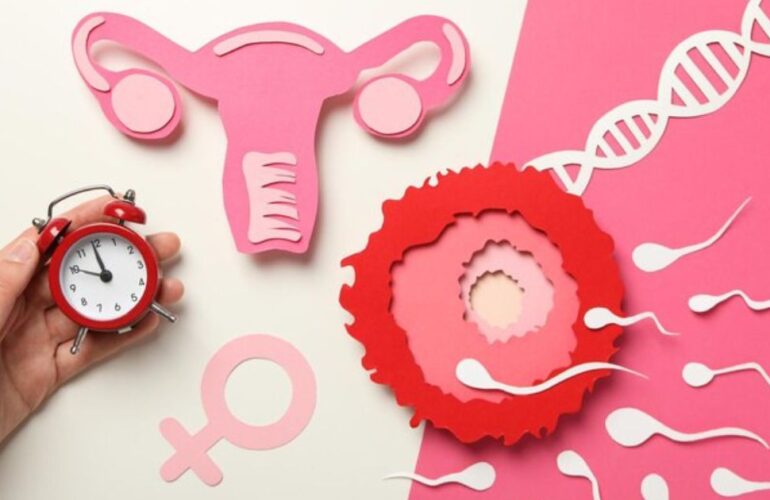What is AMH?
Anti-Müllerian Hormone (AMH) is a protein hormone produced by cells within the ovaries. It serves as a marker for assessing a woman’s ovarian reserve, which indicates the quantity and quality of her eggs. AMH levels can provide insights into fertility potential and the remaining number of eggs in the ovaries.
Significance of AMH:
AMH is a powerful hormonal messenger, acting as a barometer for a woman’s ovarian health. The level of AMH in the bloodstream is indicative of the ovarian reserve—the number of viable eggs remaining. This number holds immense importance, as it directly influences a woman’s reproductive potential. AMH measurements can offer an informed understanding of the individual’s fertility status and aid in planning the most suitable reproductive path.
Impact of Low AMH on Fertility:
Low Anti-Müllerian Hormone (AMH) levels, while not directly synonymous with infertility, wield a significant impact on a woman’s reproductive journey. Rather than causing infertility outright, low AMH serves as a powerful indicator of diminished ovarian reserve—an essential component of fertility. Understanding its effects sheds light on the intricate interplay between AMH, egg quality, and conception prospects.
- Diminished Ovarian Reserve: Low AMH signifies that the ovarian reserve—the reservoir of viable eggs—is in decline. This decrease in the egg pool directly influences a woman’s fertility prospects. As the supply of eggs dwindles, the chances of releasing a mature and healthy egg for fertilization are diminished, potentially lengthening the path to conception.
- Quality and Genetic Implications: The repercussions of low AMH extend beyond quantity to quality. Eggs accumulate genetic mutations as time progresses, potentially impacting their health and viability. The decreased AMH levels could signify not only a reduced number of eggs but also eggs that are more prone to genetic abnormalities.
- Navigating Challenges: The combination of reduced egg quantity and potential quality concerns can pose challenges to conception. The journey to fertilization might encounter obstacles due to the scarcity of optimal eggs and increased risks of genetic anomalies.
- Risks of Abnormal Fertilization and Miscarriage: The genetic mutations that eggs accumulate over time can contribute to abnormal fertilization processes and an elevated risk of miscarriage. These challenges underscore the complexities that women with low AMH might encounter on their path to parenthood.
Read to Know: Role of AMH Levels in Pregnancy?
AMH Testing:
A simple blood test has the capacity to unravel the mysteries of a woman’s ovarian reserve. AMH testing provides insights that extend beyond the surface, revealing the true essence of fertility. This diagnostic tool aids medical professionals in tailoring fertility treatments, making them more effective and personalized. The results empower women with knowledge, enabling them to make informed choices about their reproductive journey.
Low AMH Implications:
Low AMH, while often associated with age-related factors, is a condition that transcends chronological boundaries. Age remains a dominant factor; as women grow older, their ovarian reserve naturally diminishes, causing AMH levels to decline. However, other influences, such as environmental factors and genetic predispositions, can also contribute to low AMH levels. This situation can manifest as irregular or absent periods. While low AMH itself is not a direct cause of infertility, it signifies a limited pool of viable eggs. This diminished ovarian reserve can impact the quality and quantity of eggs available for fertilization, potentially leading to challenges in conceiving and an increased risk of miscarriage.
Causes Of Low AMH:
- Age: The primary contributor to low AMH levels is age. As women age, their ovarian reserve naturally decreases, resulting in diminished AMH readings and a smaller pool of viable eggs.
- Common in 40s: Women in their 40s often exhibit low AMH readings due to the progressive decline of their ovarian reserve and egg count.
- External Influences: Low AMH is not solely attributed to age. External factors play a notable role. Environmental influences, such as the aftermath of cancer treatments, can lead to decreased AMH levels, impacting ovarian health.
- Genetic Factors: Genetics also shape AMH levels. A family history characterized by early menopause can provide insights into the pace of a woman’s fertility decline. Genetic predispositions contribute to the complex interplay of factors influencing AMH.
- Multi-Faceted Landscape: The causes of low AMH create a multifaceted landscape. Age acts as the principal determinant, but environmental and genetic factors intricately intertwine, forming a diverse range of influences on a woman’s reproductive journey.
Symptoms Of Low AMH:
Unlike certain medical conditions that unveil themselves through evident symptoms, low Anti-Müllerian Hormone (AMH) remains inconspicuous in its manifestation. This subtlety can make its detection less straightforward than anticipated. While low AMH itself does not present distinct signs, there are some indirect indications that women may observe.
- Irregular or Absent Periods: A notable hint lies in the realm of menstrual cycles. Some women with low AMH may experience irregular periods or, in more pronounced cases, even the absence of periods. These deviations from a regular menstrual pattern can serve as a signal to delve deeper into fertility evaluation.
- Unveiling through Medical Evaluation: Given the elusive nature of low AMH symptoms, relying solely on physical cues might not suffice. The most reliable method for uncovering low AMH levels is through a blood test. By quantifying the AMH hormone in the bloodstream, healthcare professionals can precisely assess ovarian reserve and fertility potential.
- Partnering with Medical Experts: While low AMH might not manifest with the usual clarity of symptoms, medical expertise offers a guiding light. If irregularities in menstrual cycles or fertility concerns arise, seeking consultation with a healthcare provider becomes essential. The collaboration between women and medical professionals, alongside AMH testing, is instrumental in comprehending and navigating the subtleties of low AMH and its implications on reproductive health.
How to Treat Low AMH Levels?
When faced with low AMH levels, several strategies can be used as treatment for low AMH levels:
- Lifestyle Modifications: Adopt a healthy lifestyle that includes a balanced diet, regular exercise, and stress management. These factors can positively impact hormone levels and overall reproductive health.
- Supplementation: Consult a healthcare professional to discuss the potential benefits of supplements such as DHEA (Dehydroepiandrosterone) and Coenzyme Q10. These supplements might aid in enhancing ovarian function.
- Fertility Treatments: Assisted Reproductive Technologies (ART), such as in vitro fertilization (IVF), can be explored. A fertility specialist can tailor treatment plans to your specific needs, considering factors like age and overall health.
- Ovarian Stimulation Protocols: During IVF, specific medication protocols can be employed to stimulate the ovaries and encourage the development of multiple follicles, potentially increasing the chances of retrieving viable eggs.
- Egg Freezing: If the quantity of eggs is a concern, egg freezing (oocyte cryopreservation) can be considered to preserve a woman’s eggs at a younger age, when AMH levels are relatively higher.
- Donor Eggs: In cases of significantly diminished ovarian reserve, using donor eggs from a younger and more fertile woman might offer a viable solution for conception.
- Alternative Therapies: Acupuncture, herbal supplements, and other alternative therapies are sometimes explored alongside conventional treatments. However, their efficacy may vary, and consultation with a healthcare provider is recommended.
- Stress Reduction: Chronic stress can negatively impact hormone levels. Engaging in activities that reduce stress, such as yoga, meditation, or counseling, can be beneficial.
- Nutritional Support: A diet rich in antioxidants, omega-3 fatty acids, and vitamins can potentially support reproductive health. Consultation with a nutritionist can aid in designing a fertility-friendly diet.
- Regular Monitoring: Consistent monitoring of hormone levels and ovarian health is essential. This allows for adjustments in treatment plans based on individual responses.
Conclusion
Understanding the implications of low AMH is crucial for women seeking to conceive. While low AMH levels indicate a reduced ovarian reserve and potentially impact fertility, various treatment options, such as Natural IVF and Modified Natural IVF, offer hope for those facing this challenge. Through advancements in fertility medicine, our IVF clinic is empowering women to pursue motherhood despite low AMH levels. Remember, fertility is a complex journey, and seeking guidance from medical professionals can pave the way to informed decisions and successful outcomes.




